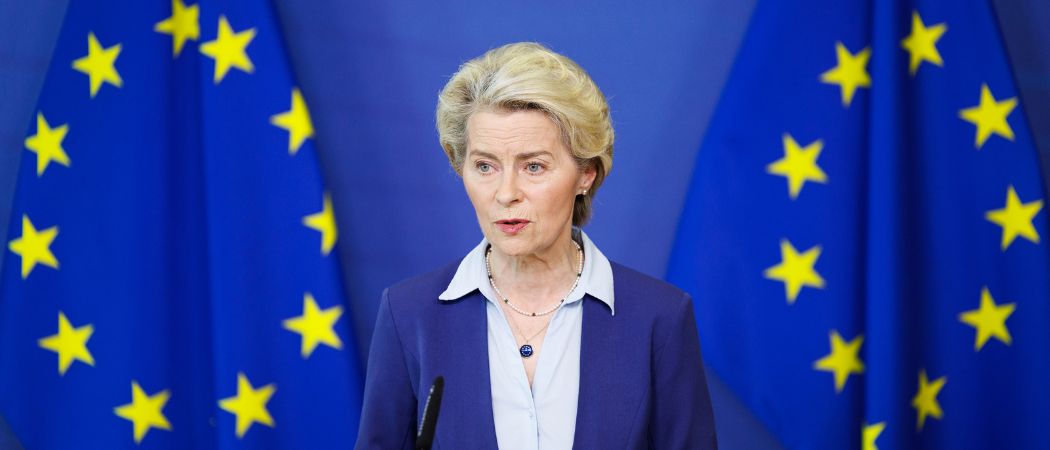The money forms part of a proposed €10B package of investment in strategic technologies. But the Commission fails to deliver on much-requested increases for other parts of Horizon Europe

European Commission President Ursula von der Leyen. Photo: Christophe Licoppe / European Union
The long-awaited review of the EU’s seven-year budget puts the European Innovation Council (EIC) in line for an extra €2.6 billion, to be channelled through the Accelerator programme which provides grant and equity funding to cash-strapped start-ups.
In its proposal for a budget revamp presented today, the European Commission asks the member states for ‘fresh’ money for the budget, including €500 million for the EIC. This will be added to €2.13 billion that is to be diverted from elsewhere in Horizon Europe and from unused research funds.
While hopes were high the budget review would inject extra money in the stretched €95.5 billion Horizon Europe research programme, if member states do agree to put in more funding this will go to the three priorities of Ukraine, migration and strategic technologies, and to the rising cost of servicing EU debts.
That leaves the EIC Accelerator as the only research and innovation initiative to get more money, despite hiccups and shortcomings in the delivery of the programme, which has a current budget of €7 billion. It got off the ground in 2021 following a three-year pilot phase, but has since run into numerous problems, from 18-month long delays in getting financing to companies, to shutting down its submissions platform with no warning to applicants over a ‘contractual dispute’ just a few weeks ago.
In the end, the Commission did not push for too much extra funding, knowing any proposal would have to be agreed by member states that are facing significant pressures in their national finances. In her call for a €66 billion top-up for the budget as whole, Commission president Ursula von der Leyen said it was a “targeted and limited proposal for the absolute must.”
Under the proposal, the ‘fresh’ investment in strategic technologies will be funnelled through the EIC and three other EU programmes: €3 billion will go to companies through the InvestEU programme, €5 billion invested in the Innovation Fund for big clean tech projects, and the €1.5 billion for dual-use technology funded through the European Defence Fund (EDF).
Sovereignty fund that never was
Continuing the tradition of EU acronyms, the Commission dubbed the extra €10 billion the Strategic Technologies for Europe Platform, or STEP. “It’s a step in the right direction,” explained EU budget commissioner Johannes Hahn.
The three strategic areas will be deep tech, clean tech and biotech. The goal is to “to ensure the EU will be a first mover in these fields,” said Hahn.
A top-up for existing programmes is not what von der Leyen promised in September, when she first floated the idea of a sovereignty fund, “targeted at boosting resources available for upstream research, for innovation and for strategic industrial projects.”
Instead, the Commission decided to forgo the grief of establishing a new funding framework and to channel the money into existing EU programme. “There was an idea and the idea is still alive, the spirit of it,” said Hahn. “We don’t have to reinvent the wheel, everything is ready, and we can focus on what is needed and not get lost in negotiations over a new fund.”
The extra funding for the EIC will be to provide equity-only support, with each investment ranging from €15 million to €50 million, to high-risk SMEs that are scaling up strategic technologies.
The EDF top-up will be invested in deep tech and digital technologies to boost performance and introduce new defence products.
Beyond the money, STEP introduces a special seal for high-quality projects that fail to get funding due to limited resources. The seal, the Commission hopes, will help the projects secure funding from member state-managed Cohesion funds. This is comparable to the Seal of Excellence offered under parts of Horizon Europe for projects that meet quality criteria but don’t get grants because there is not enough money.
To help companies gain access to the new financing, the Commission promises to set up a one-stop information point.
“We expect with leveraging and crowding in of private capital that this will result in an investment capacity of €160 billion for STEP,” said von der Leyen.
The road ahead
Before STEP becomes reality, it needs approval of the European Parliament and member states, some of which have already said publicly that straitened finances at home mean they can’t contribute more to the EU. Hoping to secure support, Hahn called it a “targeted, ambitious but defendable proposal.”
The negotiations over the proposal will also go hand in hand with the talks on the EU budget for 2024. In this case, the proposal the Commission presented earlier this month includes €13.6 billion for research.
At that time, MEPs in the budget committee expressed high hopes for a top-up to the research budget in the midterm review. “For us, this is a decoy budget for next year, because the actual budget is going to come later on, in a couple of weeks,” said centre-left MEP Victor Negrescu said at the time. “We want to see not only a review but an actual improvement that would allow us to meet people’s expectations.”





 A unique international forum for public research organisations and companies to connect their external engagement with strategic interests around their R&D system.
A unique international forum for public research organisations and companies to connect their external engagement with strategic interests around their R&D system.